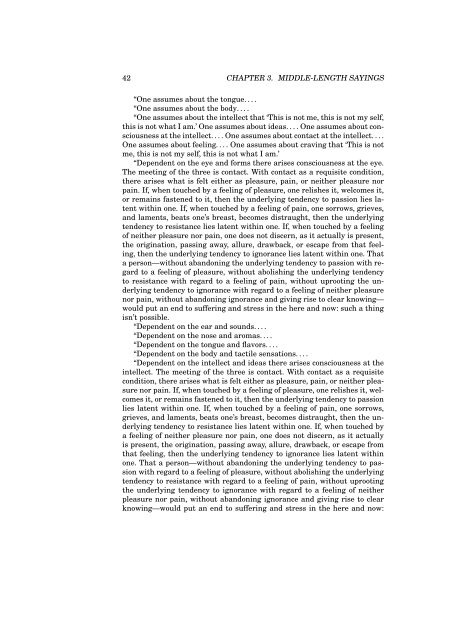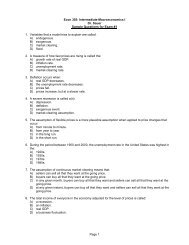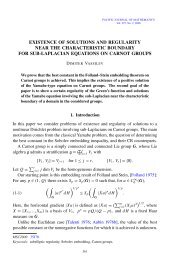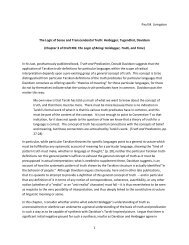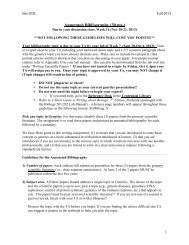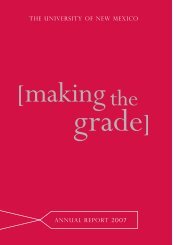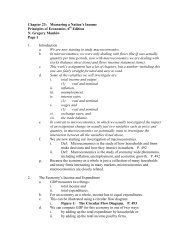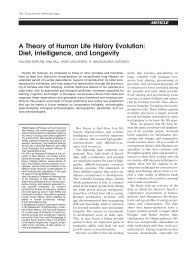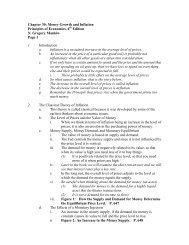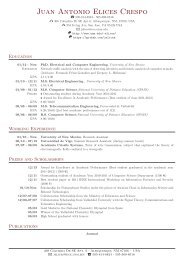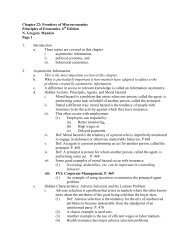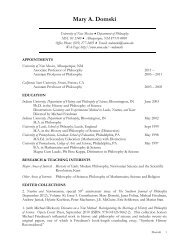Philosophy 438 Indian Buddhist Philosophy Buddhist Views of the ...
Philosophy 438 Indian Buddhist Philosophy Buddhist Views of the ...
Philosophy 438 Indian Buddhist Philosophy Buddhist Views of the ...
Create successful ePaper yourself
Turn your PDF publications into a flip-book with our unique Google optimized e-Paper software.
42 CHAPTER 3. MIDDLE-LENGTH SAYINGS<br />
“One assumes about <strong>the</strong> tongue. . . .<br />
“One assumes about <strong>the</strong> body. . . .<br />
“One assumes about <strong>the</strong> intellect that ‘This is not me, this is not my self,<br />
this is not what I am.’ One assumes about ideas. . . . One assumes about consciousness<br />
at <strong>the</strong> intellect. . . . One assumes about contact at <strong>the</strong> intellect. . . .<br />
One assumes about feeling. . . . One assumes about craving that ‘This is not<br />
me, this is not my self, this is not what I am.’<br />
“Dependent on <strong>the</strong> eye and forms <strong>the</strong>re arises consciousness at <strong>the</strong> eye.<br />
The meeting <strong>of</strong> <strong>the</strong> three is contact. With contact as a requisite condition,<br />
<strong>the</strong>re arises what is felt ei<strong>the</strong>r as pleasure, pain, or nei<strong>the</strong>r pleasure nor<br />
pain. If, when touched by a feeling <strong>of</strong> pleasure, one relishes it, welcomes it,<br />
or remains fastened to it, <strong>the</strong>n <strong>the</strong> underlying tendency to passion lies latent<br />
within one. If, when touched by a feeling <strong>of</strong> pain, one sorrows, grieves,<br />
and laments, beats one’s breast, becomes distraught, <strong>the</strong>n <strong>the</strong> underlying<br />
tendency to resistance lies latent within one. If, when touched by a feeling<br />
<strong>of</strong> nei<strong>the</strong>r pleasure nor pain, one does not discern, as it actually is present,<br />
<strong>the</strong> origination, passing away, allure, drawback, or escape from that feeling,<br />
<strong>the</strong>n <strong>the</strong> underlying tendency to ignorance lies latent within one. That<br />
a person—without abandoning <strong>the</strong> underlying tendency to passion with regard<br />
to a feeling <strong>of</strong> pleasure, without abolishing <strong>the</strong> underlying tendency<br />
to resistance with regard to a feeling <strong>of</strong> pain, without uprooting <strong>the</strong> underlying<br />
tendency to ignorance with regard to a feeling <strong>of</strong> nei<strong>the</strong>r pleasure<br />
nor pain, without abandoning ignorance and giving rise to clear knowing—<br />
would put an end to suffering and stress in <strong>the</strong> here and now: such a thing<br />
isn’t possible.<br />
“Dependent on <strong>the</strong> ear and sounds. . . .<br />
“Dependent on <strong>the</strong> nose and aromas. . . .<br />
“Dependent on <strong>the</strong> tongue and flavors. . . .<br />
“Dependent on <strong>the</strong> body and tactile sensations. . . .<br />
“Dependent on <strong>the</strong> intellect and ideas <strong>the</strong>re arises consciousness at <strong>the</strong><br />
intellect. The meeting <strong>of</strong> <strong>the</strong> three is contact. With contact as a requisite<br />
condition, <strong>the</strong>re arises what is felt ei<strong>the</strong>r as pleasure, pain, or nei<strong>the</strong>r pleasure<br />
nor pain. If, when touched by a feeling <strong>of</strong> pleasure, one relishes it, welcomes<br />
it, or remains fastened to it, <strong>the</strong>n <strong>the</strong> underlying tendency to passion<br />
lies latent within one. If, when touched by a feeling <strong>of</strong> pain, one sorrows,<br />
grieves, and laments, beats one’s breast, becomes distraught, <strong>the</strong>n <strong>the</strong> underlying<br />
tendency to resistance lies latent within one. If, when touched by<br />
a feeling <strong>of</strong> nei<strong>the</strong>r pleasure nor pain, one does not discern, as it actually<br />
is present, <strong>the</strong> origination, passing away, allure, drawback, or escape from<br />
that feeling, <strong>the</strong>n <strong>the</strong> underlying tendency to ignorance lies latent within<br />
one. That a person—without abandoning <strong>the</strong> underlying tendency to passion<br />
with regard to a feeling <strong>of</strong> pleasure, without abolishing <strong>the</strong> underlying<br />
tendency to resistance with regard to a feeling <strong>of</strong> pain, without uprooting<br />
<strong>the</strong> underlying tendency to ignorance with regard to a feeling <strong>of</strong> nei<strong>the</strong>r<br />
pleasure nor pain, without abandoning ignorance and giving rise to clear<br />
knowing—would put an end to suffering and stress in <strong>the</strong> here and now:


